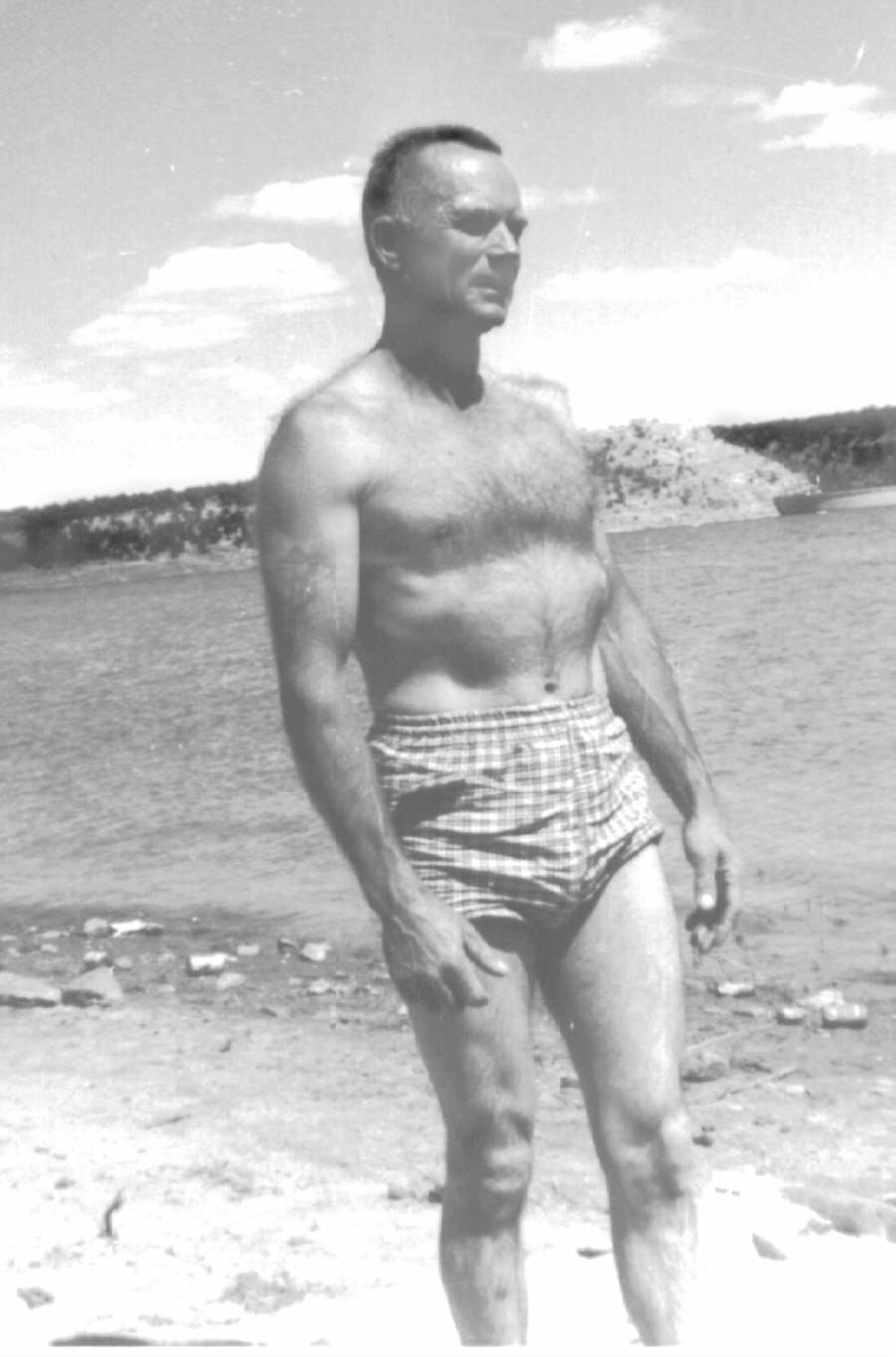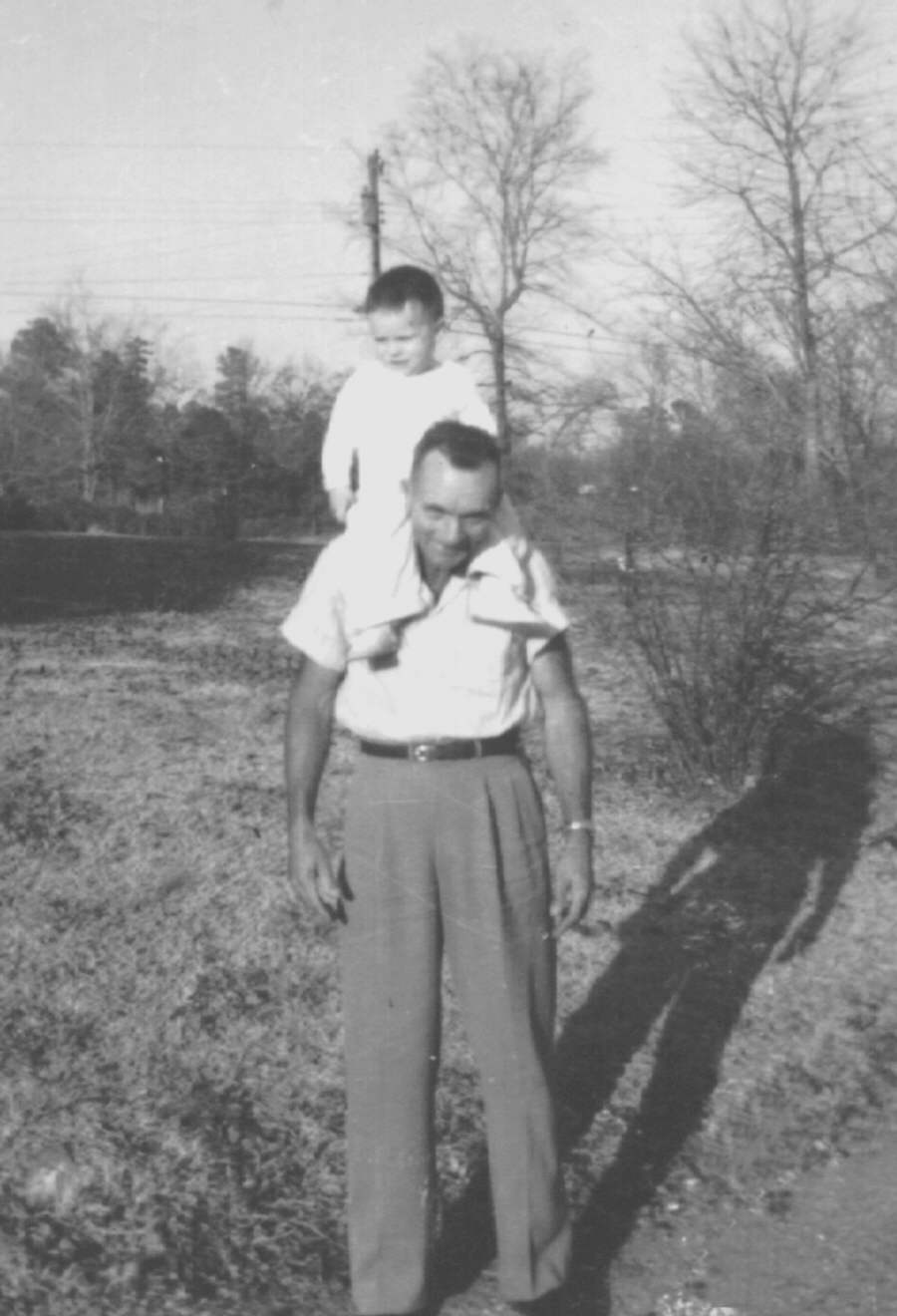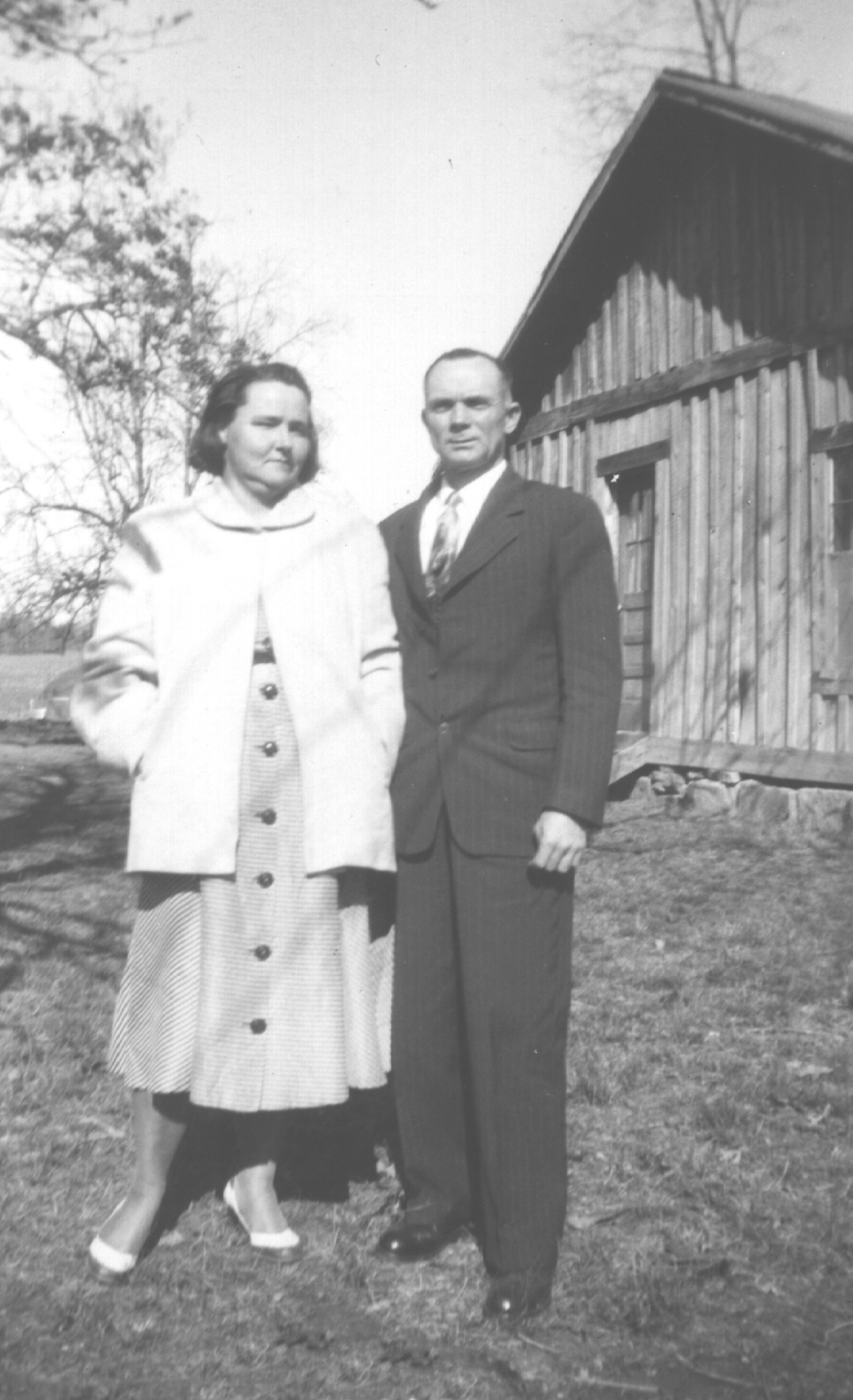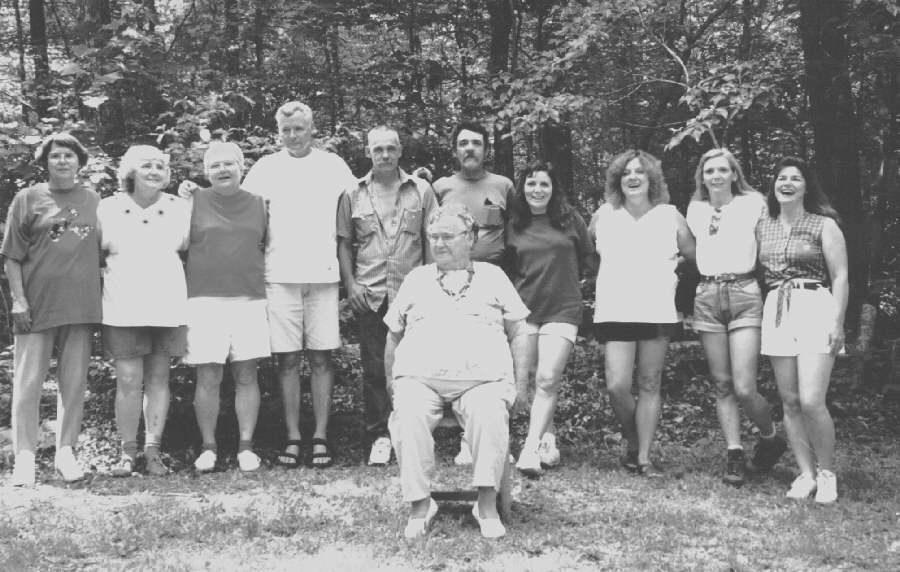
Sandia Mountain - 1960
Louise and H. N. Frasier
The Story of my Life
Louise Virginia (Weir) Frasier
| Home | Introduction | Preface | Chapters | Do You Remember? | Stuff | Contact |
Chapter XXIII
|
H |
oyt Nathaniel Frasier (Daddy) was my other half and in this case I think the better half. First of all he was a man. He had the same faults that all humans have. He would not tell a lie. Sometimes I got mad at him about that, for I believe that if telling the truth hurts someone, it’s better to lie.
Daddy was the type of person who liked to learn. His brothers looked up to him and admired him. One of them said, when he died, “There is a smart man. If there was anything he didn’t know, he would hunt until he found a book about it and talked to people about it until he did know.”
A lot of people didn’t understand Daddy. His type of work kept him moving. He wanted a family and roots, but he wanted his roots to be his family, not a place. In other words, his roots were in his family. His home was where his hat and family were.
Daddy wanted a big family and he wanted them well fed— and I’m not talking about food for the natural body, although that too is important. I’m talking about food for the mind and the soul. He had to be away from home a lot of the time except week-ends, so didn’t have much time for the children. But each one of them will tell you that the time he spent with them was quality time. He taught them how to be honest, upright citizens, to keep an open mind, and no judging! for you’re judged with the same measure you give. Let each one of us be our own judge. He taught them about finances, showed them how to keep checking accounts and to keep their place in society clean.
He did a good job. We never had much money but if there was a waterfall, we saw it. If there was a rainbow, we saw it. If there was a snow, we saw it. He taught the children to listen to the corn talk and to listen to the wind.
Daddy taught our children that you worship and honor God by liking yourself and by realizing that you are God’s, and that you should be able to take responsibility for your own deeds or acts, good or bad. He taught them that “God is Love”. And love is not the opposite of hate but the essence of all life.
Daddy did not value money for money alone. He’d say, “The world is full of money. If money is what you want, I’ll get it.” But he said that lives are made of much more than money. Security is within each of us. Riches are love, pride, honesty, a good job, fun, and watching nature.
He sought truth. He not only read the Bible, he studied it. For he said we could all find rules for living, truth, and beauty in the Bible. He made the children memorize the 23rd and 91st psalms.
Daddy said he didn’t know what it was like to be ‘dead’— that is without a physical body. But he did know we’d be like Jesus—able to have, or not have, a physical body after we ‘died’. He believed that Jesus really lived and died, and that by being willing to suffer death, all men were restored to the same position that Adam had. He said that after Jesus died for all men, we all became the sons of God—not first sons, but adopted sons. And that adopted children have the same rights as natural children.
If someone wanted the piece of bread he was eating, he’d give it to them. He traveled many miles alone, back and forth to work. He always picked up hitch hikers. Sometimes they would try to pay him but he would tell them, “No. It didn’t cost me extra for you to ride, just return the favor to someone else some day.” Sometimes, he’d give the hitch hiker a few dollars for a meal or go out of his way to take them where they needed to go.
 |
Sandia Mountain - 1960 Louise and H. N. Frasier |
If he went somewhere, he wanted me and the kids to go
along to get a haircut, to talk to the banker, to talk to a judge, to talk to a
school teacher, to the union hall, to go to the tax office. He’d say, “I’ll be
right back. While I’m gone, watch the people pass—how they walk, how they hold
themselves, what they’re wearing—and imagine what their lives must be like.
 |
Hoyt Nathaniel Frasier |
Daddy thought of himself as a little man. But he wasn’t. He was all man. He would stand before the mirror for hours looking at himself, making faces, flexing his muscles. He wanted to pretend that he liked hunting, fishing, and sports, because the men he worked with did and talked about those things.
But Daddy did not like to kill, and what did you go hunting for if not to kill. He liked to fish if he could find a quiet place to meditate while his hook was in the water—and if there were no fish around. He did not like competitive sports. But he exercised up until he died… Mostly alone or with the kids.
He loved to be a father and he loved to be a grandfather. There were sixteen grandkids when he died. Now there are thirty-two. But I tell you additional sixteen grandkids that he knows you, and he loves you.
Daddy would get these urges to go to church and wouldn’t go without me and the kids. Several years before he died, he said it was race consciousness that made us want to do things. Our forefathers thought it was wrong not to go to church so we went because of the old memory planted in our minds.
When he was twenty years old, he made a vow to God that he would do anything God told him to do. And I can say without a doubt that from the time I knew him at age twenty-two until he left the body at age fifty-eight he did every thing God would have him do.
These have not been the things I wanted to say about him. Or not the way I think they should be said, so maybe I’m not ready to write about him yet. Maybe I haven’t forgiven him for leaving me to complete his work.
 |
Hoyt Nathaniel
Frasier
and Oldest Grandson, Alan Platt |
He could not tolerate any pain. The first year we were married, he got a corn stalk under his big toe nail. He had cut the toes out of his shoes and was plowing. He wouldn’t let me get near his foot and wouldn’t go to the doctor. That corn stalk stayed under his toe nail until his toe festered and almost blew the corn stalk out.
Once, he had a boil on his arm. He petted that thing until his arm almost fell off. Every half hour, he put a new remedy on it. It finally burst and I never knew what helped it get better. He didn’t either for he’d tried too many things.
Daddy did not begin using tobacco until he was twenty years old. He smoked when I met him. He tried to quit—sometimes wouldn’t smoke for two or three weeks. But he was so ill natured when he didn’t smoke that I was always glad when he started smoking again. Then in 1948, sixteen years after we were married, he left for work, came back about thirty minutes later with a carton of Camels. He put the carton of cigarettes on the mantle and said, “With God’s help, I’ve quit smoking.” I said, “Oh yeah!” But he never smoked again and he’d tell people not to “smoke around mama, it makes her sick.”
Once about four years before he ‘died’ his back had been hurting. He was working at Questa in the northern part of New Mexico. I was up spending the weekend with him. There was snow everywhere. On Sunday morning he got up and said he was going to the top of the mountain where there was no snow and the sun was shining and get some sun on his back.
He never went anywhere without me but that time he did. He reached the top where there was a big rock with no snow. He pulled his pants and underwear off and laid down on his stomach in the sun. His back felt so good that he went to sleep and when he woke up his butt was blistered. He almost didn’t make it to the house. He couldn’t work for about ten days!
Daddy said he didn’t want to be friends with his kids. He wanted them to like
him, and he liked them, but he was their father, not their friend. Liking and
loving are two different things. We all love our children and they love us.
But do they like us? Or do we like them? Daddy liked all of his children and
he had no doubt that all of them would be good people.
 |
Mama and Daddy Louise and Hoyt N. Frasier |
Today is October 20, 1991. Hoyt Nathaniel Frasier, my husband of thirty-eight years was killed in a truck, car accident near Brownfield, Texas on Monday, May 26, 1968.
 |
The House on
Lookout Mountain Louise (Weir) Frasier and Hoyt N. Frasier |
To sum all
of this up, H.N. Frasier labored very hard all the days of his life and I believe he had
achieved his dream. When he left the body of H.N. Frasier, he was driving along
going home, when such joy filled his being with a feeling of a job well done
that it became important for him to cross over or leave the body. Sometimes in
order to grow we have to do this. How do I know these things? Because he told
me.
I’ll add this for Daddy, then I’m stopping. We have ten beautiful good people who chose us to be their parents. Maybe some of them or maybe none of them have attained that goodness we would want for them. But neither have I. We’ve all done the best we can.
 |
1996 on
Lookout Mountain Virginia, Dot , Carrie, Hoyt, Bill, John, Pat, Margie, Evelyn, Martha Mama – Louise Virginia (Weir) Frasier |